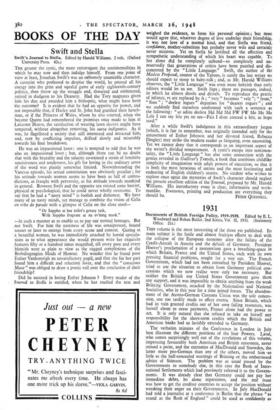BOOKS OF THE DAY
Swift and Stella
THE greater the cynic, the more extravagant the sentimentalities in which he may now and then indulge himself. From one point of view at least, Jonathan Swift's was an extremely unamiable character. A careerist who professed to despise the world, he poured all his energy into the grim and squalid game of early eighteenth-century politics, then threw up the struggle and, thwarted and embittered, retired in dudgeon to his Deanery. Had the Tory magnates given him his due and awarded him a bishopric, what might have been the outcome? It is evident that he had an appetite for power, and not impossible that, if Harley and St. John had gratified their hench- man, or if the Princess of Wales, whom he also courted, when she became Queen had remembered the promises once made to him at Leicester House, the satisfaction of wearing lawn sleeves might have tempered, without altogether removing, his saeva indignatio. As it was, he flagellated a society that still interested and attracted him, and, rent by conflicting impulses, drifted slowly and miserably towards his final breakdown.
He was an impassioned hater : one is tempted to add that he was also an impassioned lover ; but, although there can be no doubt that with the brutality and the salacity co-existed a strain of feminine sensitiveness and tenderness, his gift for loving in the ordinary sense of the word was plainly somewhat limited. Notwithstanding the Vanessa episode, his sexual constitution was obviously peculiar ; for his attitude towards women seems to have been as full of contra- dictions, as fraught with perversity, as his attitude towards mankind in general. Between Swift and the opposite sex existed some barrier, physical or psychological, that he could never wholly overcome. To say that he had a "nasty mind" is foolish and dishonest. We have many of us nasty minds, yet manage to combine the vision of Celia en robe de parade with a glimpse of Celia on the close stool- " Or Sappho at her toilet's greasy task, With Sappho fragrant at an ev'ning mask."
—in such a manner as to enable us to pay our normal homages. But not Swift. For him the nastiness of life was omnipresent, bound sooner or later to emerge from every scene and context. Gazing at a beautiful woman, he was immediately attacked by horrid specula- tions as to what appearance she would present were her exquisite features fifty or a hundred times magnified, till every pore and every blemish were as plain to view as the rugged complexions of the Brobdingnagian Maids of Honour. No wonder that he found poor Esther Vanhomrigh an unsatisfactory pupil, and that she for her part found him a difficult and reluctant lover, and that the "conscious Muse" was obliged to draw a poetic veil over the conclusion of their friendship!
Did he succeed in loving Esther Johnson ? Every reader of the Tournal to Stella is entitled, when he has studied the text and
weighed the evidence, to form his personal opinion ; but most would agree that, whatever degree of love underlay their friendship, it was not love of a normal kind, and that Stella was friend, confidante, mother-substitute but probaby never wife and certainly never mistress. Yet on Stella he lavished all the affection and sympathetic understanding of which his heart was capable. To her alone did he completely unbend—so completely and un- reservedly that generations of critics have been puzzled and dis- concerted by the "Little Language." Swift, the author of the Mociest Proposal, creator of the Yahoos, is surely the last writer we should expect to stoop to baby-talk ; and, as Mr. Harold Williams observes, the "Little Language" was even more babyish than early editors would let us see. Swift lisps ; there are passag-es, indeed, in which he almost drools and drivels. To reproduce the prattle of infancy, rs are replaced by /s ; " very " becomes " vely "; "from," " flom " ; " deelest logues " deputises for "dearest rogues " ; and we suddenly find ourselves confronted with 'such a sentence as the following: "so adieu deelest Md Md Md FW FW Me Me Me Lele I can say lele yet oo see—Pals I dont conceal a bitt, as hope savd."
After a while Swift's indulgence in this extraordinary jargon (which, it is fair to remember, was originally intended only for the amusement of Esther Johnson and her devoted friend, Rebecca Dingley) may strike the modern reader as fatiguing, even nauseating. Yet we cannot deny that it corresponds to an important aspect of the writer's divided temperament. A cynic's escape into sentimen- tality, the "Little Language" has also some connection with the genius revealed in Gulliver's Travels, a book that combines childlike simplicity of imagination with adult powers of execution, so that it is both the most ferocious of satires and the most fascinating and endearing of English children's stories. No student who wishes to explore once again the mysteries of Swift's character should neglect the present excellent edition of the yournal, prepared by Mr. Harold Williams. His introductory essay is clear, informative and work- manlike. Footnotes, printing and production are everything they


































 Previous page
Previous page